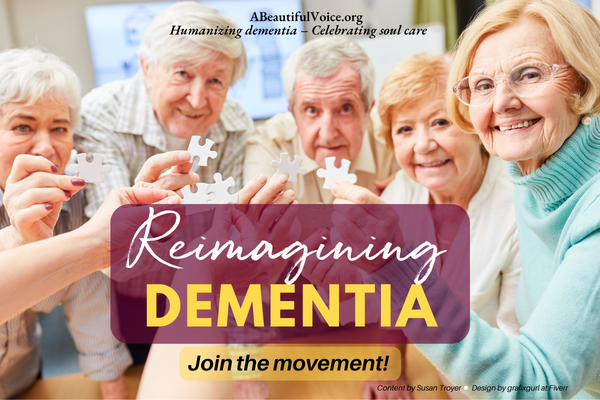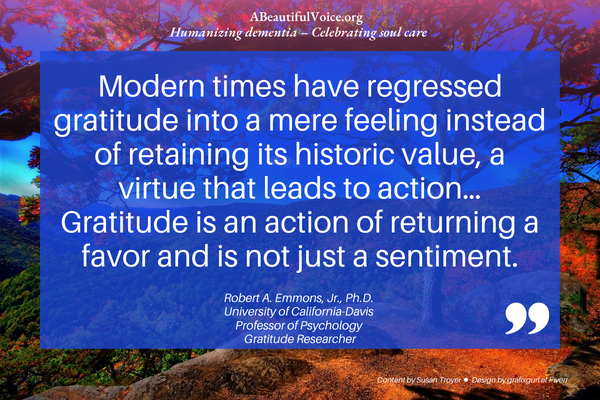Having just posted a quote by Robert Emmons, PhD, on our Facebook page, I was reminded of my parents’ non-stop gratitude when we were “care-living” together (1998-2012). If there had been just one single, intangible factor which kept us together and well-functioning during those years, it was the constant expression of gratitude.
“If a pill could do this, everyone would be taking it”
Many of our readers have already tuned in to the benefits of gratitude as it relates to one’s personal health and well-being. The online publication of the Mayo Clinic Health System identifies some benefits of gratitude in this article: Can expressing gratitude improve your mental, physical health?
Expressing gratitude is associated with a host of mental and physical benefits. Studies have shown that feeling thankful can improve sleep, mood and immunity. Gratitude can decrease depression, anxiety, difficulties with chronic pain and risk of disease. If a pill could do this, everyone would be taking it. – Mayo Clinic Health System
I am a realist – and I am aware that not every family has a positive experience in which one’s elders living with dementia reside in an environment where the expression of gratitude with the family care partner goes both ways. Differences among individuals living with dementia can be wide-ranging – just as in all family dynamics.
But I would suggest that this is due – at least in part – to the cultural mindset with which dementia care is understood. The old narratives see the elder living with dementia only through the murky lens of the past. The new narratives see the person living with dementia through a new lens.
Breaking the stigma surrounding dementia care by recognizing capabilities of our loved ones
Dr. Al Power, geriatrician and dementia educator, is quoted in another meme recently posted on our blog page, stating that it’s important to remind ourselves about the capabilities of people living with dementia. “They do learn, do grow, and are able to give care as well as receive it.”
I would add another significant capability to this list: elders living with dementia are also able to express gratitude. I experienced its importance in our household, and, in addition, I heard first-hand from our care partners who were recipients of the gratitude expressed by my parents. It validated the mantra of “It’s about dignity” – around which we began our life at the ranch following Mother’s diagnosis.
A beautiful quote by English poet John Milton which was recently published on grateful.org helps to describe the connection which I have experienced between gratitude and reverence while being with my parents:
“Gratitude bestows reverence, allowing us to encounter everyday epiphanies, those transcendent moments of awe that change forever how we experience life…and the world.”
As members of the dementia community, we need to recognize the importance of how our own perception regarding the capabilities of the person living with dementia contributes to the well-being of the person. If the culture of care teaches us to have low expectations in caring for loved ones – as it too frequently does – that will be what we achieve…! Insignificant outcomes with indifference about the person’s capabilities are too commonly accepted.
“Changed, but still magnificent”
When Lady Gaga performed with Tony Bennett, her description of him was “changed, but still magnificent.” We could honor all persons living with dementia by acknowledging the ways in which they are still “magnificent”!
Recognizing the capabilities of elder loved ones living with dementia is essential in meeting their basic human needs. By doing this, we acknowledge the person to be “changed,” but still fully human and, therefore, capable of giving and receiving expressions of gratitude.
It’s an important matter for which there has been very little support to “raise our expectations.”

“Taking It to the Streets” to raise cultural awareness
A coalition for justice called “Reimagining Dementia” of which I am a member has begun the work of raising cultural expectations via a global campaign titled “Taking It to the Streets.” It is officially launching in September.
I am delighted to bring this information to our audience, as it holds great potential for helping to break through the stigma surrounding dementia.
Meanwhile, I believe that if families and carers were to embrace the practice of gratitude with elder loved ones, it would be simply transformational.
Posted by: Susan Troyer, MS, BA

Member:



Leave A Comment